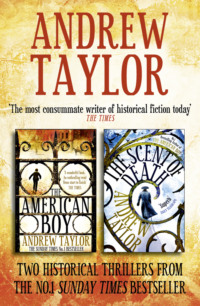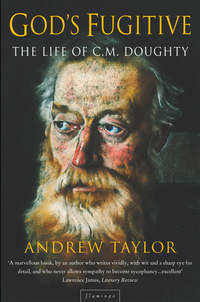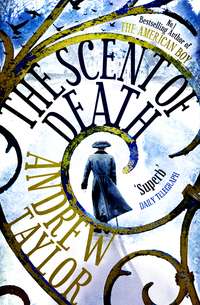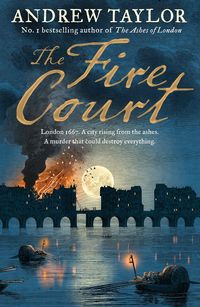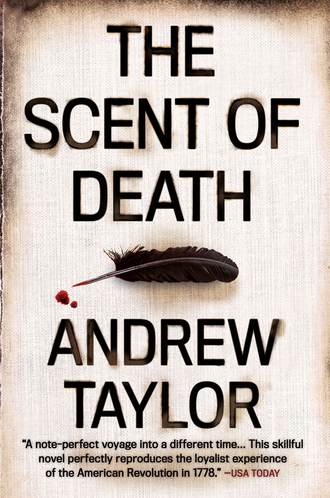
Полная версия
The Scent of Death
By the time I reached the pastry-cook’s, there was no sign of the woman and the girl. I could no longer hear the child’s cries. Either the two of them were obscured by the throng of passers-by or they had turned into another shop or down one of the narrow alleys that punctuated the line of buildings.
Why such apparently furtive behaviour? Was Miriam outside the house on some unlicensed errand? Was it possible that she was married? Could the child be hers? I began to doubt it had been Miriam – after all, I had barely glimpsed the young woman and the light had been poor.
I returned to Warren Street. Josiah answered my knock on the street door. The old man helped me remove my hat and greatcoat, murmuring gently that the ladies were in the drawing room and Judge Wintour was at work in his library. He turned aside to dispose of my coat.
‘Josiah?’
‘Sir?
‘I saw Miriam this evening. At least I believe I did.’
Josiah hung my coat without undue haste. He faced me and bowed, his face expressionless.
‘She was with a child – a negro girl, an infant. Has Miriam a daughter?’
‘No, sir.’
Josiah bowed again and retreated into the shadows at the back of the hall.
It cannot have been more than a week later that Captain John Wintour came home. I have a note of the date: it was on Thursday, 12 November. He had been badly wounded at Saratoga and, by his own account, had spent many months on the borders of life and death. An old and feeble-witted woman stumbled across him half dead in a wood when she was gathering kindling near her cottage. She had nursed him back to health.
Eventually he had reached Canada and found his way to Kingstown, where there were cousins of his mother who were able to shelter him; but his health had broken down again. Fortunately he had, in his own words, the constitution of a horse and had recovered sufficiently to be able to undertake the voyage home.
He arrived in Warren Street in the evening. It was the dead hour before supper. As chance would have it, when he knocked at the door I was descending the stairs on my way to the parlour.
The younger manservant, Abraham, let him in, trying to say a few words of welcome. Wintour pushed past him and stood in the middle of the hall, legs apart and hands in the pockets of his patched greatcoat, which had clearly been made for someone much smaller. He was a spare man of about thirty, with flushed, bony features and deep-set eyes, which were an unusually bright blue. He stared at me.
‘And who the devil are you?’ he demanded, swaying as he spoke.
‘My name is Savill, sir. Have I the honour of meeting Captain Wintour?’
‘Indeed, sir. The honour is entirely mine.’ Wintour attempted a bow, staggered forward and righted himself. ‘You must be the gentleman from the American Department. My father told me.’
‘Yes, sir. You have—’
The parlour door opened and Mrs Wintour almost ran to her son, an extraordinary exhibition of physical energy from the old lady. She embraced him. The Captain closed his eyes and patted her shoulder. With his other hand he scratched his nose.
Next came the Judge, more slowly. He looked his son up and down.
‘I am happy to see you home, John,’ he said.
‘Yes, sir. And – and I to be here.’
‘You are – you are fatigued?’
‘It has been a long day, sir, and my health is not yet quite restored.’
‘Then perhaps you should rest – after you have seen Bella, of course. Let Abraham take your coat.’
Mr Wintour took his wife’s arm and drew her from her son. The Captain held out his arms and let the slave ease the coat away from him.
No one looked in my direction. I thought they had forgotten me.
There were footsteps on the stairs. I turned. Mrs Arabella was rounding the bend at the half-landing. She paused at the top of the last flight down to the hall.
First she must have seen me. She let her eyes drift past me to the group in the hall below. I could not see her expression because the light was dim and the flame of the candle she held was below the level of her chin.
But the candlelight revealed two things about Mrs Arabella. It showed her slim white neck. It showed that she was swallowing repeatedly, as if trying to force down an unpalatable morsel. And the flame also picked out her hand holding the top of the newel post, and how the fingers gripped it so tightly that the skin wrinkled.
The Captain looked up. ‘Ah – there you are, madam. My pretty, witty wife.’
Chapter Nineteen
Townley was a hospitable man, who talked easily to anyone, and perhaps let his tongue wag more freely than a gentleman should. But I enjoyed his company because he was almost always cheerful and had a pleasant wit.
I would sometimes sup with him, either alone or with two or three of his friends. On those occasions I saw another side of New York, for the gentlemen around the table were Loyalists of course but, unlike those who came up to my office in Broad Street, they were on the whole content with their lives.
‘I bless the day,’ Townley confided to me in a fit of drunken confidence, ‘when those damned Yankees dumped the tea in Boston Harbour. Indeed, sir, it has been the making of us here.’
We were sitting at table in a small private room in the King’s Arms. The shutters were up and a fire of unseasoned wood crackled and spluttered in the grate. Two other men, a contractor and a commissioner for the harbour administration, made up the party. But they were oblivious to our conversation for they were engaged in an animated discussion about the need to bring in professional actresses at the John Street Theatre.
‘Surely it must be difficult for you,’ I said to Townley. ‘Since so many goods are in short supply, there must be a constant—’
‘Supply and demand, sir,’ Townley interrupted. ‘That’s what the students of political economy call it. It is a beautiful thing, for the supplier at least. If the available stock diminishes, you raise the price of what you have. Or, if demand remains keen when the supply is exhausted, you simply sell promises instead, which is like selling air. No, for a man with his wits about him, this war has been a blessing.’
He hesitated, frowning. I ran my finger round the rim of my glass and tried not to smile.
‘Of course, sir, I do not mean to suggest that the war is – well, in any way, even in the slightest, a desirable thing, but – taken, as a whole, you understand, considered in the round – there is no harm in a man looking to his own interests.’ Townley wagged his forefinger in front of my face. ‘Always with the proviso, my dear sir, that His Majesty’s interests must be served, first and foremost, without fear or favour, in any—’
‘Sir,’ I said gently, ‘I believe I understand you perfectly. Should we drink a toast to His Majesty?’
‘Indeed.’ Townley seized the bottle and burst out laughing from sheer animal spirits. ‘And damnation to his enemies. Good God, I had not realized it was so early. Shall we call for the punchbowl?’
By the time the party broke up it was nearly midnight. As we went outside, I almost recoiled from the cold. November was well advanced now, and so was winter.
Townley and one of the other men had servants to light them home. The third man took a waiting hackney chair. I decided to walk back to Warren Street. It was only a step away and the exercise would clear my head. Despite the lateness of the hour, the streets were still busy, for the city came alive at night with theatre parties, musical entertainments, suppers and dances. I knew my way perfectly and I believed, if a man was cautious, there could be no danger.
On the other side of the road, facing the fields, I saw the silhouettes of the prison and the poorhouse looming square and black against the sky. As I drew level with them, I turned up towards King’s College.
It was darker here and there were fewer people about. Someone ahead was whistling. A dog barked in the distance, somewhere near Freshwater Pond. The ferrule of my stick tapped against the paving stones. The change of direction brought me into the wind, which was blowing hard from the north. I felt its chilly bite on my neck above the collar of the greatcoat, and it cut through the thin silk of my stockings.
It was the wind that saved me. It was the wind that made me slacken my pace to adjust my muffler, which had worked loose.
Directly ahead, a man shot out from a dark entry between two buildings. But for my change of pace, he would have collided with me. Simultaneously, I heard footsteps behind me, whose presence I had already registered, footsteps that now were speeding up.
‘It’s him,’ said a man’s voice behind me.
I’m trapped.
I raised the stick above my head and turned sharply to the right, which brought my back to the blank wall of the building beside me.
The man in front leapt at me. I slashed the stick down in a diagonal arc. I heard a cry of pain. Metal chinked on stone.
I reversed the direction of the stick and swung it blindly backwards. I shouted, a wordless cry. The stick landed on something soft. It twisted like a live thing. I lost hold of it and swore at my assailant.
As suddenly as it had begun, it was over. There were more running footsteps. My two attackers darted into the alley. A couple of men gave chase, whooping and hallooing as if they were chasing hares.
‘Run, boyo, run,’ someone cried in great excitement, his voice bouncing against the walls of the alley.
I leaned back against the wall, hunched over and drawing breath in great shuddering gasps. As the danger subsided, my mind filled with all the stories I had heard of assault and robbery on the streets of New York, of the brutish attacks by drunken soldiers and vulgar criminals which the military authorities so rarely troubled to check.
‘Sir?’ It was an English voice, a gentleman’s. ‘Are you hurt?’
I looked up. ‘Thank you, no.’
‘Good God, this town is a perfect nursery of crime.’
Another man came running up to us, this one bearing a lantern. By its light I made out that my rescuer was a middle-aged naval lieutenant, with a footman to light his way.
‘Your arrival was providential, sir.’ I paused, for I still found it hard to breathe. ‘I cannot thank you enough.’
‘I can’t take the credit, sir – a pair of soldiers chased the villains away.’
His servant picked up my stick and handed it to me.
‘Footpads,’ my rescuer said, gripping the hilt of his dress sword. ‘Sprang on you like – like a pair of tigers on a goat. Saw that happen once, sir, in the East Indies. Not a pretty sight, believe me.’
‘Did you see the rogues, sir?’ I asked.
‘No, sir. Too dark to see more than the shape of them. Tell you what, though: I’d lay ten to one they were negros. You know that musty smell their clothes have, sir?’ The lieutenant sniffed, as if to illustrate his point. ‘I’ve often remarked it. Thieving magpies, the whole pack of them. They’d steal their grandmother’s teeth if they could.’
I shifted position and one of my shoes kicked against something that scraped on the pavement. I bent down and picked up the object, holding it so the light from the lantern fell upon it.
For a moment no one spoke. In my hand was a knife with a crude horn handle. The blade was about eight inches long and sharpened to a tapering point.
The lieutenant touched the blade with a fingertip. ‘After your purse and your rings, I suppose,’ he said. ‘But if need be, I dare say they would not have scrupled to murder you while they were at it.’
Chapter Twenty
Fear has a terrible habit of breeding fear; it spreads like maggots through rotting meat.
Once the danger was past I began to tremble. My rescuer kindly ignored my shameful weakness and escorted me to Warren Street. No one was about, except for servants. The lieutenant would not stay – his ship sailed at dawn tomorrow. I would have welcomed the company of anyone, even Captain Wintour, whose conversation, I had discovered, was not always agreeable. Instead I drank rum and water alone in the parlour, huddled over the banked-up fire, and the alcohol seemed to have no effect on me whatsoever.
My mind raced to and fro. It was as if it were under the influence of a powerful stimulant. When at last I retired to bed, I could not sleep.
Time and again, I ran over what had happened and what might have happened. The memory of my own unheroic conduct made me toss and turn in the smothering embrace of the featherbed.
Time and again, I returned to that terrible moment when the man had bounded out from the alley in front of me, and the footsteps behind had speeded up.
It’s him. That’s what the man behind me had said. It’s him.
After a sleepless night, I walked through the rain-slicked streets to Headquarters and asked to see Marryot. His servant ushered me into the Major’s private room. A masked white figure was sitting by the window. Two blue eyes, gleaming bright as if illuminated from within, stared out of the blank white face. For an instant I believed my mind had given way under the strain.
The moment dissolved and reformed itself: Marryot was swathed in a sheet, with his scalp and face lathered white. A regimental barber stood to one side, sharpening his razor on a strop. The blade slapped to and fro, glinting as it passed through a shaft of weak sunshine from the window.
I bowed.
‘Good morning to you, sir,’ the Major said, revealing the vivid pink of his mouth and an irregular palisade of blackened teeth. ‘You’ll forgive me if I don’t stand.’
‘Of course. I’m obliged to you for seeing me at such short notice.’
‘And how may I serve you?’
I glanced at the barber. ‘I wished to speak privately. Shall I wait until you are at leisure?’
‘You could wait all day for that and most of tomorrow as well. The General is to inspect the fortifications at King’s Bridge, and I am ordered to accompany him.’ Marryot looked up at the barber. ‘Wait outside. Send for more hot water.’
We waited in silence until the man had withdrawn, closing the door behind him.
Marryot did not ask me to sit. ‘Well, sir? What is it?’
‘I was set upon last night. It was about midnight – I was walking back to Warren Street after supping with Mr Townley at the King’s Arms.’
‘Were you robbed?’
‘No. Two soldiers came to my aid and chased the villains off.’
‘Were you hurt?’
‘No.’
‘All in all, a happy escape,’ he said. ‘I congratulate you, sir. And now, if that is—’
‘Sir, I am not altogether easy in my mind about this. There was something … something contrived about the attack. It was as if they had been lying in wait.’
‘What are you saying?’
‘I felt as if I had walked into a trap, sir. There was a man in front and a man behind.’
‘But perhaps you had walked into a trap. Robbers work in pairs often enough.’
‘They had been waiting for me.’ I paused. ‘For me. Not for any passer-by that might have had a purse in his pocket. It’s him. That’s what one of them said.’
‘Well? All that means is that they had picked you out earlier as a likely mark.’
‘No, sir, I do not think so. Or they would not have made their attempt with so many witnesses about.’
Marryot sighed. ‘In my experience a robber can be as foolish as any man alive.’
‘Would you assist me in one thing at least? It would greatly set my mind at rest if I might talk to the two soldiers who chased them off. They may be able to tell me more about the men who attacked me. Besides, I should like to reward them. They may well have saved my life.’
‘Did you see their facings?’
‘No, sir. To all intents and purposes it was dark.’
‘So for all you know, they might have been from Provincial or militia—’
‘I heard them shouting, sir,’ I said, thinking, Run, boyo, run. ‘I believe I detected that one of them had a Welsh accent. Of course they may have come from a Loyalist regiment, but it is more probable that they did not.’
‘Very well.’ The lather on Marryot’s face was drying: cracks appeared, revealing the pink skin beneath. ‘I shall have enquiries made. And I suppose Mr Townley may learn something from his own informants.’
There was nothing to be gained by prolonging the meeting. I took my leave. But as I reached the door—
‘One other thing, sir,’ Marryot said. ‘How do they do in Warren Street?’
‘Very well, thank you, sir.’
‘And Captain Wintour? Pray, how is he?’
‘He improves every day, I believe,’ I said. ‘But his wound and the privations he endured have left their mark.’
‘His family must rejoice to have him restored to them. How are his parents? And – and Mrs Arabella, of course?’
‘Quite well, thank you.’
‘Pray pass on my compliments to them all, Mr Savill. I have not thought it proper to call in person to congratulate them on Captain Wintour’s happy return. In case his health still caused anxiety, you understand.’
‘I am sure that they are always happy to receive you, sir.’
‘You think so?’
I knew that when he spoke of the Wintours he meant Mrs Arabella and I pitied him for his doglike devotion. ‘I am perfectly convinced of it.’
‘Then I’m obliged to you, sir.’ The eyes blazed in the cracked white mask. ‘And I wish you good day.’
Chapter Twenty-One
Shortly before Christmas, I had occasion to become better acquainted with Captain Wintour. We found ourselves alone at supper one day; the ladies had not come down and the Judge was suffering from a head-cold and had kept to his room. It was chilly, and afterwards we drew up our chairs to the parlour fire.
‘It is so confoundedly dull here,’ he said, prodding the logs with a poker. ‘My father should entertain more. And we should be seen out and about in the world, where we belong. We are one of the first families of the province. Besides, a man cannot spend all his time at home with his wife, can he?’
I nodded, acknowledging the remark but not answering it.
‘Mark you, sir, Mrs Arabella is an adornment to any assembly or private party. She is wasted in Warren Street, shut up where nobody sees her. The Wintour diamonds are the best in New York, you know, and she looks charming in them. They were my grandmother’s. After the war is over I shall take Mrs Arabella to London and she shall wear them at court.’
‘You have visited London before, sir?’
‘As a young man, I passed several months there.’ Wintour clicked his fingers. ‘But let us have a game. What shall it be, sir? Cards? Backgammon? We can play by the fire – they will bring us up another bottle and we shall be famously snug.’
We were drinking an old madeira, pale and golden like watery sunlight. Mr Wintour had put aside a few bottles until the end of the war, so he would have a fitting wine with which to drink the King’s health when victory was declared. But his son argued that if they left the wine much longer, it would be spoiled; it would be better to drink it now.
‘Let us make this more interesting,’ he suggested as we were waiting for Josiah to bring up another bottle, and a second one too in case it should be needed. ‘Let us put a trifle on the outcome. I find that a stake concentrates the faculties wonderfully.’
Josiah brought the wine and Captain Wintour shouted at him for forgetting to bring the cards and the backgammon as well. The old man bowed low and said nothing, though I knew as well as he did that he could not have forgotten because he had not been ordered to bring them in the first place.
When the slave returned, Wintour had him set up a little table between us. It had flaps that drew out at either end, and we placed a candle on each of them. The Captain opened the backgammon board and laid out the ebony and ivory counters with trembling fingers. The arrows had been painted a delicate shade of green and they rested on a black ground. The board made a pretty sight in flickering light. It was a handsome set, as good as anything I had seen in London apart from the dice, which were clearly of colonial manufacture, being made of bone and crudely painted.
‘They say this is a game of chance, sir,’ Wintour said, taking up his glass. ‘But that is all stuff and nonsense, is it not? Chance may dictate the fall of the dice but, taken all in all, it’s skill that counts. When I waited for my ship in Quebec, I paid for my dinners with backgammon.’
A counter slipped from his hand. His wine glass tilted. Madeira splashed on to the board and formed a small, glistening puddle in one of its corners.
‘Goddamn it!’ He stared at the board and slowly shook his head.
‘It don’t signify, sir.’ I took out a handkerchief and dabbed at the wine. ‘It is only a drop or two. See – it is gone.’
Wintour stared at the handkerchief. ‘You’ve cut yourself.’
‘What? Where?’
‘Your hand, I apprehend – look at the handkerchief.’
I held the square of cloth to the light of the nearer candle. He was right: the cambric had a reddish tinge resembling blood in one corner. I examined my hand. The skin was unbroken.
‘It must be paint, sir, not blood,’ I said.
‘Very likely,’ Wintour said, losing interest in the matter as swiftly as he had gained it.
I frowned. The ground of the board looked black in the candlelight but it was possible that it was really a very dark red.
He reached for the bottle. ‘Shall we put a guinea on the first game, sir?’
‘Or there might have been blood,’ I said slowly. ‘A spot of blood on the board.’
As I spoke I imagined someone – Mrs Arabella, perhaps – pricking her finger by accident while she was sewing, with the board open before her. Or even suffering an unexpected nosebleed, such as one sometimes had as a result of a heavy cold. A few drops of blood might so easily have fallen on the board and lain there, drying in a moment, and invisible against the dark paint, particularly if the bloodletting had happened in poor light. The madeira had reliquefied the blood, bringing it back to a watery half-life.
‘Well, sir – guinea?’ said Wintour, sharply. ‘I find a little wager lends spice to a game, any game at all. Playing for love is so confoundedly dull.’
I had not played backgammon since my arrival in America. To begin with I found it difficult to concentrate. I lost the first game quite unnecessarily, allowing Wintour to gammon me.
‘We play according to Hoyle’s rules, do we not?’ he said, almost crowing with triumph. ‘If I remember rightly that means we double the stake. And therefore we triple it for a backgammon.’
I nodded, though I could not recall that the chapter on backgammon in Mr Hoyle’s book said anything about wagers at all, only a great deal on the mathematical probabilities of chance in relation to two six-sided dice.
Wintour paused to drink a toast to Dea Fortuna. He refilled his glass while I set the thirty men back on the board. By the time the first bottle of madeira was empty, he owed me eleven guineas.
‘Double or quits?’ he cried, as he set the pieces for the next game. ‘What do you say?’ He placed his bets with a sort of wild enthusiasm that rode roughshod over mere calculation.
There was a tap on the door and Miriam slipped into the room. She walked almost silently towards Wintour and stood by his chair, her head bowed and her hands clasped tightly together in front of her as if holding a secret.
‘Well, sir? Double or quits?’
‘If you wish, sir.’ I made up my mind that, if I lost, this must be the last game.
I smelled a hint of Mrs Arabella’s perfume in the air, clinging to the maid’s dress or her hands. I looked up at Miriam and saw the whites of her eyes flickering in the shadows behind her master’s chair. She was a comely young woman, in her way. She turned her head away from me.



